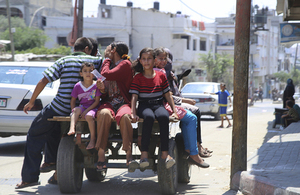UK to double support for Palestinian economy to advance peace with Israel
The new UK aid programme will help create hundreds of jobs, install vital water and electricity infrastructure, and boost exports to Israel, the UK and beyond.

Photo: Jo Harrison/DFID
The UK Government is set to more than double its support for economic development in Gaza and the West Bank to create the necessary conditions for lasting peace between Israel and the Occupied Palestinian Territories.
The new UK aid programme will help create hundreds of jobs, install vital water and electricity infrastructure, and boost exports to Israel, the UK and beyond, Middle East Minister Alistair Burt announced today (Friday 27 July). The announcement will see the UK provide up to £38 million over five years (2018-2023) to support economic activity in Gaza and the West Bank.
UK aid support will promote Israeli-Palestinian cooperation by lowering barriers to economic growth and improving the financial sustainability of the Palestinian Authority. This will include delivering significant reforms to increase the Palestinian Authority’s ability to raise millions of pounds in uncollected revenues and taxes. These measures will help the Palestinian Authority to invest in vital services such as healthcare and education.
The new UK aid programme will:
- help construct the Gaza Central Desalination Plant, which will increase access to clean piped water and help replenish the Gaza aquifer, and in turn help all Gazans access clean water;
- provide finances to install solar panels for households, businesses, hospitals and public buildings so they can have a reliable, affordable and clean source of electricity;
- connect Palestinian IT firms and UK businesses to create jobs for Palestinians;
- fund experts to help the Palestinian Authority work with the Government of Israel to unblock the transfer of taxes and custom revenues estimated to be worth £220m per year from the Government of Israel to the Palestinian Authority; and
- provide technical support to help Palestinian businesses export more, including by reducing logistics costs, removing barriers to exporting and helping them meet international standards.
Minister for the Middle East, Alistair Burt, said:
A thriving Palestinian economy is crucial to achieving peace with Israel but wages in Gaza are now lower than two decades ago and Palestinians could slide even deeper into poverty without urgent action.
Our new approach to supporting the economy in Gaza and the West Bank will help create desperately needed jobs, boost exports and collect taxes so that the Palestinian Authority can invest properly in vital services such as education and healthcare. Our work will also help to create reliable electricity and clean water supplies.
As well as alleviating the urgent pressures on the Palestinian economy, this will help to create the necessary conditions for a peaceful two-state solution, which would allow Palestinians to truly prosper.
For a truly sustainable economic recovery in Gaza, we urge all parties to refrain from actions which make peace more difficult and cause unnecessary suffering. That means Hamas and other terrorist groups must cease all violent and provocative actions and Israel must reverse its restrictive measures and work with the international community to ease the difficult conditions in Gaza.
Currently only 4% of the water in Gaza is safe to drink, and insufficient sewage treatment facilities put residents at greater risk of water borne diseases – over 40 swimming pools worth of raw sewage are directed into the Mediterranean Sea every day.
The lack of affordable and reliable water supplies also has a direct impact on the economy, including by limiting the growth of the agricultural sector which has reduced the amount of available jobs and increased the cost of food.
UK aid will help to import construction materials for the Gaza Central Desalination Plant, as well as upgrading water infrastructure in Gaza and the West Bank to improve drinking water supplies and reduce pollution. This will result in 55 billion litres of safe drinking being pumped into Palestinian homes and businesses in Gaza every year.
On top of this, Gazans currently receive just five hours of electricity per day on average, putting further strain on hospitals and other vital services that rely on unsustainable fuel supplies.
UK aid will help to finance solar panels for hospitals, businesses and households, increasing the availability of power as well as cleaner and cheaper alternatives to fuel-based generators.
To reduce subsidies in the electricity sector – around 5 per cent of GDP in Gaza – UK aid will help Palestinian electricity authorities to be self-sufficient by increasing the number of paying customers. This will reduce the amount spent on public subsidies and allow the Palestinian Authority to invest more in public services, such as education and healthcare.
To further boost the economy, the UK will work closely with both Israel and the Palestinian Authority to make it easier for Palestinians to sell their goods – including food, marble, stone and plastic products – to Israel and other countries in the region. The UK will also provide direct assistance to help Palestinian businesses reach new export markets around the world.
As well as helping the Palestinian Authority to work with Israel to unlock £220m worth of annual taxes and revenues, we will work with the Palestinian Authority’s Ministry of Finance and Planning so that it can take control of the collection of its own customs revenue.
Notes to editors
- The UK will provide up to £38 million over five years (2018-2023) to support economic activity in Gaza and the West Bank. This is more than double the amount of UK aid support previously provided for economic development in the Occupied Palestinian Territories, which totalled £16 million in the last five years (2013-2018).
Last updated 27 July 2018 + show all updates
-
Added full translation into Arabic
-
Added translation
-
First published.